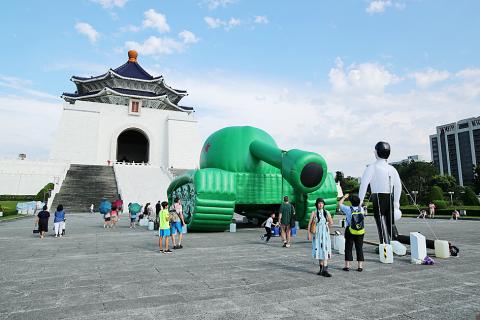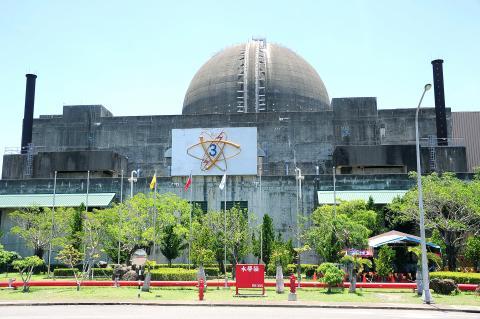The Chinese Nationalist Party (KMT) yesterday urged China to confront the history of the Tiananmen Square protests and acknowledge the protesters’ calls for democracy and freedom.
The KMT in a statement on the 30th anniversary of the Tiananmen Square Massacre said it believes that “historical facts must not be concealed and that truth must not be undermined.”
Chinese authorities should acknowledge and value the protesters’ calls for democracy and freedom, because “facing history and allowing those requests from people to be truthfully presented is the only way to heal the pain from the past and move toward a better future,” it said.

Photo: Ritchie B Tongo / EPA-EFE
In the past 30 years, the Republic of China (ROC) has lifted martial law to become the first Chinese-speaking nation to embrace democracy and the rule of law, the KMT said.
“The party will continue to stand with the people to commemorate June 4, support democracy, respect the rule of law and defend the ROC — so that it can continue to be a beacon of freedom for Chinese around the world,” it said.
It would also “continue telling the mainland and the world that it values freedom, democracy and diversity,” the KMT said.
To advance their political interests, certain political leaders have tried to distort history under the pretense of promoting justice or reforms, against the principles of democracy and the rule of law, it added.
“Leaders on both sides of the Taiwan Strait must return to what they had committed to do: identify with the nation, respect the rights of the people and improve people’s lives,” the party said.
Over the past three decades, China has made impressive progress following successful economic reforms, Kaohsiung Mayor Han Kuo-yu (韓國瑜) said in a statement.
Hopefully Taiwan’s experience and conviction in promoting democracy would be helpful to China when it takes the next step to promote political reforms, he said.
“What happened on June 4 three decades ago was a historical tragedy,” Han said, adding: “We hope everyone can learn from history and avoid making the same mistake.”
The Chinese government should deal with the historical trauma “wisely” and seek to build a political system that would meet the expectations of a majority of Chinese, he said.
Former New Taipei City mayor Eric Chu (朱立倫) said on Facebook that some believe that they should not mention the Cultural Revolution or the massacre to avoid offending China, but he disagrees with that view.
Memories of the incident still haunt those who lived through it and their families, and their pain would not end until the truth is uncovered, responsibility allotted and lessons learned, he said.
As Taiwan’s experience with the 228 Incident and the White Terror era shows, “history can never be concealed and the best approach is to face it,” Chu said.
Hon Hai Precision Industry Co chairman Terry Gou said that the massacre has left a “trauma that needs to be healed.”
He feels great sorrow and sympathy for the people who were hurt during the massacre as well as their families, and hopes that Taiwan’s freedom and democracy would serve as an example to China, he told reporters on the sidelines of an event in Taipei.
Asked to comment on the massacre at an event at National Taiwan Normal University, KMT Legislator Wang Jin-pyng (王金平) said: “June 4 must not be forgotten, and we must defend Taiwan’s democracy and freedom.”
Chu, Gou and Wang are seeking the KMT’s presidential nomination for next year’s presidential election, while Han has yet to announce a presidential bid.

A fugitive in a suspected cosmetic surgery fraud case today returned to Taiwan from Canada, after being wanted for six years. Internet celebrity Su Chen-tuan (蘇陳端), known as Lady Nai Nai (貴婦奈奈), and her former boyfriend, plastic surgeon Paul Huang (黃博健), allegedly defrauded clients and friends of about NT$1 billion (US$30.66 million). Su was put on a wanted list in 2019 when she lived in Toronto, Canada, after failing to respond to subpoenas and arrest warrants from the Taipei District Prosecutors’ Office. Su arrived at Taiwan Taoyuan International Airport at 5am today on an EVA Air flight accompanied by a

An essay competition jointly organized by a local writing society and a publisher affiliated with the Chinese Communist Party (CCP) might have contravened the Act Governing Relations Between the People of the Taiwan Area and the Mainland Area (臺灣地區與大陸地區人民關係條例), the Mainland Affairs Council (MAC) said on Thursday. “In this case, the partner organization is clearly an agency under the CCP’s Fujian Provincial Committee,” MAC Deputy Minister and spokesperson Liang Wen-chieh (梁文傑) said at a news briefing in Taipei. “It also involves bringing Taiwanese students to China with all-expenses-paid arrangements to attend award ceremonies and camps,” Liang said. Those two “characteristics” are typically sufficient

A magnitude 5.9 earthquake that struck about 33km off the coast of Hualien City was the "main shock" in a series of quakes in the area, with aftershocks expected over the next three days, the Central Weather Administration (CWA) said yesterday. Prior to the magnitude 5.9 quake shaking most of Taiwan at 6:53pm yesterday, six other earthquakes stronger than a magnitude of 4, starting with a magnitude 5.5 quake at 6:09pm, occurred in the area. CWA Seismological Center Director Wu Chien-fu (吳健富) confirmed that the quakes were all part of the same series and that the magnitude 5.5 temblor was

Restarting the No. 2 reactor at the Ma-anshan Nuclear Power Plant would take up to 18 months, Minister of Economic Affairs J.W. Kuo (郭智輝) said today. Kuo was answering questions during a meeting of the Legislative Yuan’s Economics Committee, where legislators are considering amendments to the Renewable Energy Development Act (再生能源發展條) amid concerns about the consequences of the Pingtung County reactor’s decommissioning scheduled for May 17. Its decommissioning is to mark the end of Taiwan’s nuclear power production. However, Chinese Nationalist Party (KMT) lawmakers have proposed an amendment to the Nuclear Reactor Facilities Regulation Act (核子反應器設施管制法) that would extend the life of existing